Bolstered by politicians, the ‘love jihad’ brigade has arrived in Mumbai, scouring through court circulars on new marriage registrations to trace interfaith couples prepping to seal their relationship. Is Maharashtra headed the UP way?
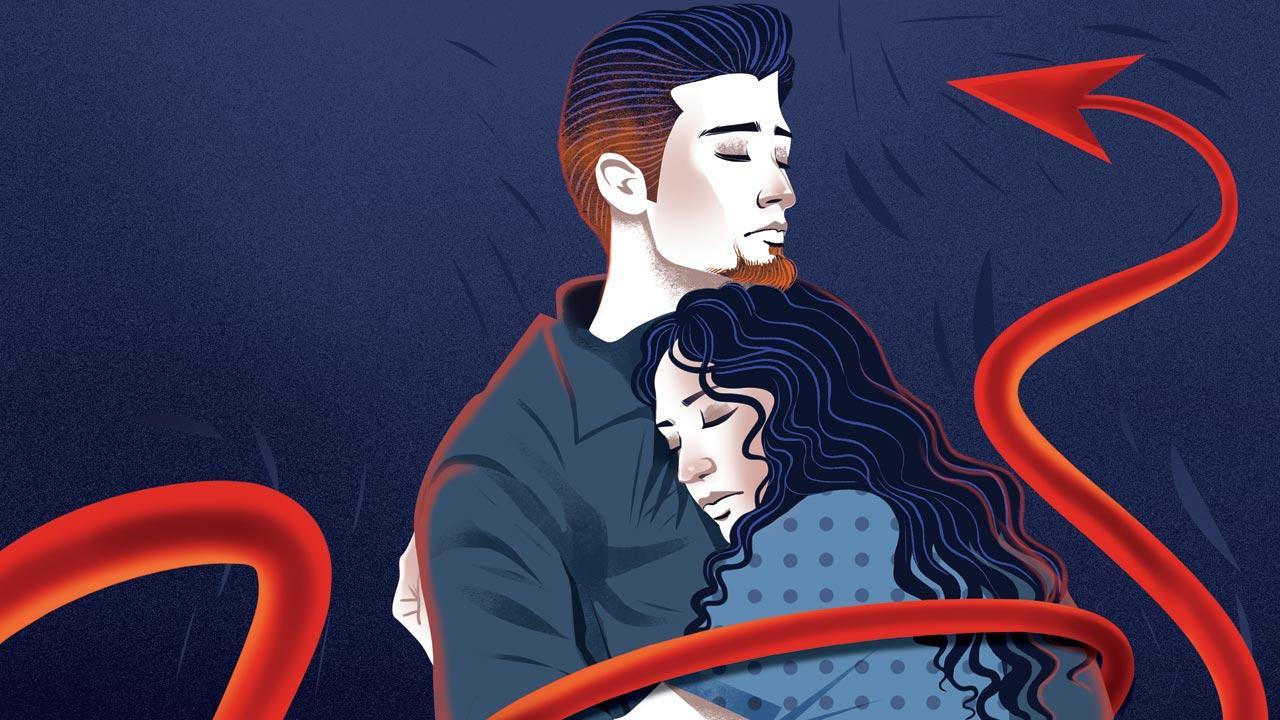
Illustration/Uday Mohite
What is jihad, you ask? If you leaf through one of the most trusted Urdu-to-Urdu dictionaries, Feroz-ul-Lughat, first published in 1897, you will come across words like koshish and jad-o-jehad. English synonyms to these Urdu words would be effort, struggle, toil, strive and labour, translated in the Muslim world as “personal struggle towards righteousness”. But this is not what the Vishwa Hindu Parishad (VHP) or other right-wing organisations demanding laws against “love-jihad” say it means. “Muslim men are converting innocent Hindu women to Islam [on a large scale] using fraud and deception like love,” Milind Parande, national general secretary of VHP, tells mid-day in a telephonic interview.
On December 13, the Eknath Shinde-Devendra Fadvanis led Maharashtra government constituted a state-level panel—Intercaste/Interfaith Marriage-Family Coordination Committee. One of the key functions of the panel, which came in the wake of the gruesome murder of Shraddha Walkar, allegedly by her live-in partner Aftab Poonawala in May 2022, was to monitor marriages out of caste or religion. Walkar was estranged from her family.
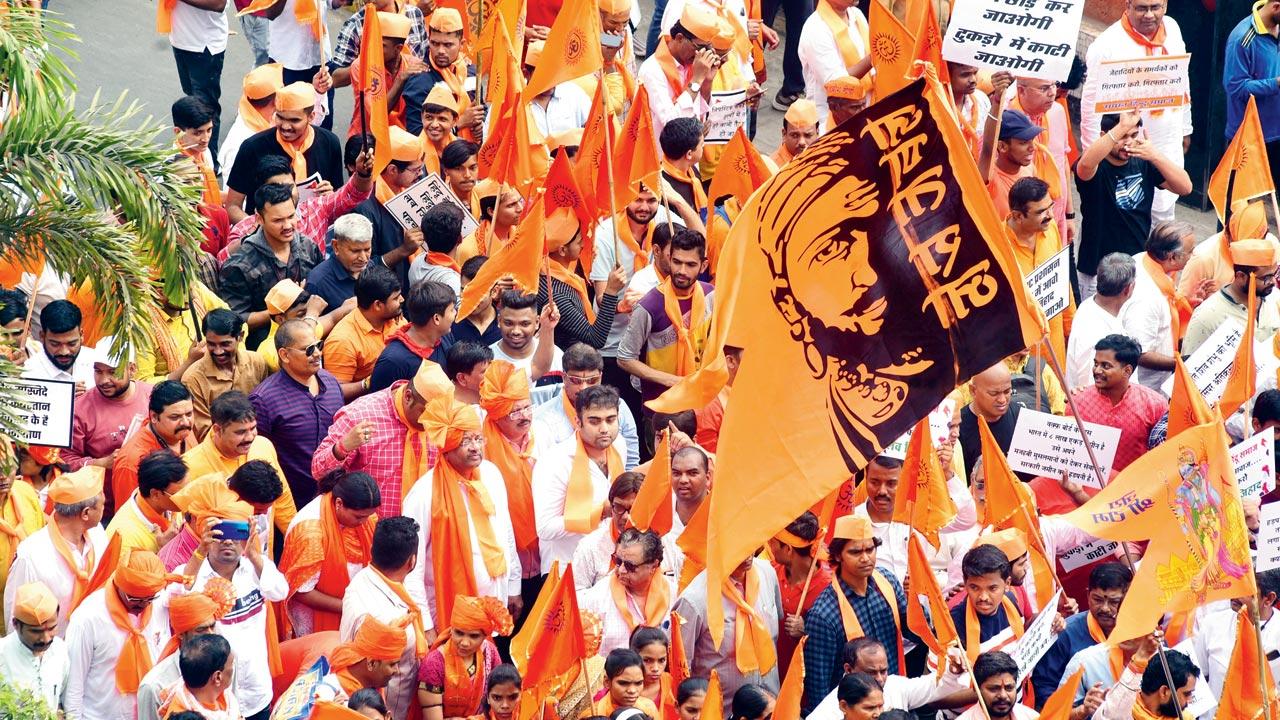 Sakal Hindu Samaj made up of the VHP, Bajrang Dal, Durga Vahini and other right-wing outfits has taken out rallies against love jihad in at least 20 of Maharashtra’s districts, including Mumbai, in the last four months. Pic/Shadab Khan
Sakal Hindu Samaj made up of the VHP, Bajrang Dal, Durga Vahini and other right-wing outfits has taken out rallies against love jihad in at least 20 of Maharashtra’s districts, including Mumbai, in the last four months. Pic/Shadab Khan
The Government Resolution (GR) issued by Maharashtra’s Women and Child Development (WCD) Department in December said that the 13-member committee, headed by state minister of the WCD department Mangal Prabhat Lodha, would gather contact details of the women who have eloped to marry across religions, and find out if the marriage is against the wishes of the parents. This would include those marriages solemnised in temples, religious places, and even those registered in court. The GR stated that parents and the women involved would be questioned about the reality of the situation and the committee would attempt reconciliation if the two parties were estranged. After studying the cases, a detailed report would be furnished and a decision would be taken on such marriages.
Deputy Chief Minister Devendra Fadnavis later stated that the preliminary GR was incorrect and that the state government promoted intercaste marriages and had plans to extend financial rewards to those who marry across castes. As a result, the panel was renamed Interfaith Marriage-Family Coordination Committee (IMFCC).
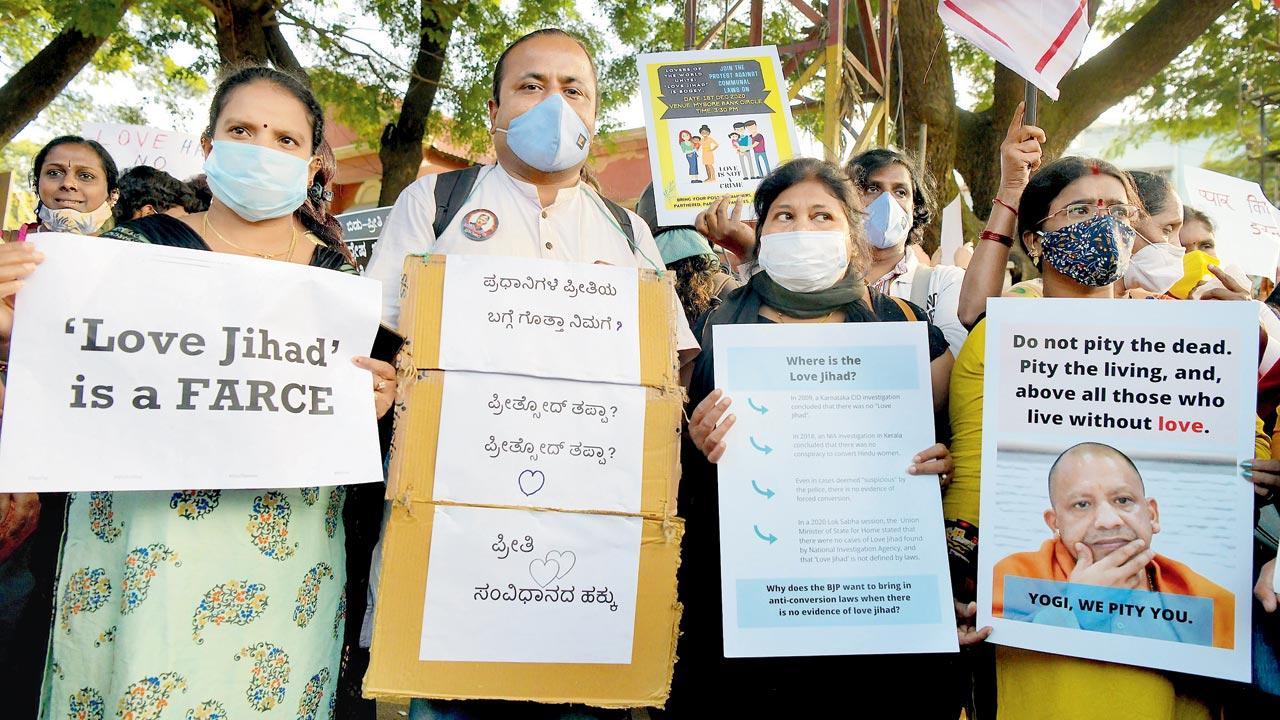 Women and human rights organisations are seen here protesting against anti-love jihad laws in Bengaluru on December 1, 2020. Pic/Getty Images
Women and human rights organisations are seen here protesting against anti-love jihad laws in Bengaluru on December 1, 2020. Pic/Getty Images
A month after it was set up, the committee claimed it had already received 152 complaints. There have been two meetings of the committee so far, but Lodha refused to divulge specific details of the cars when contacted by mid-day. “The committee is for women who have married outside their faith, and want to re-establish contact with their parents after being torn away from them,” he says. Lodha, however, remained evasive about couples in live-in relationships being monitored, considering the panel was a direct response to Walkar’s murder by her live-in partner. “We cannot say if live-in relationships will be included, but the purpose is to avoid a repeat of the Walkar case.”
More evidence of the Maharashtra government’s growing surveillance emerged when Fadnavis, who also holds the home, and law and planning departments, stated that the Maharashtra government would be studying anti-love jihad laws in place in other Indian states. Meanwhile, fringe right-wing elements have been amping up pressure to see such a law through.
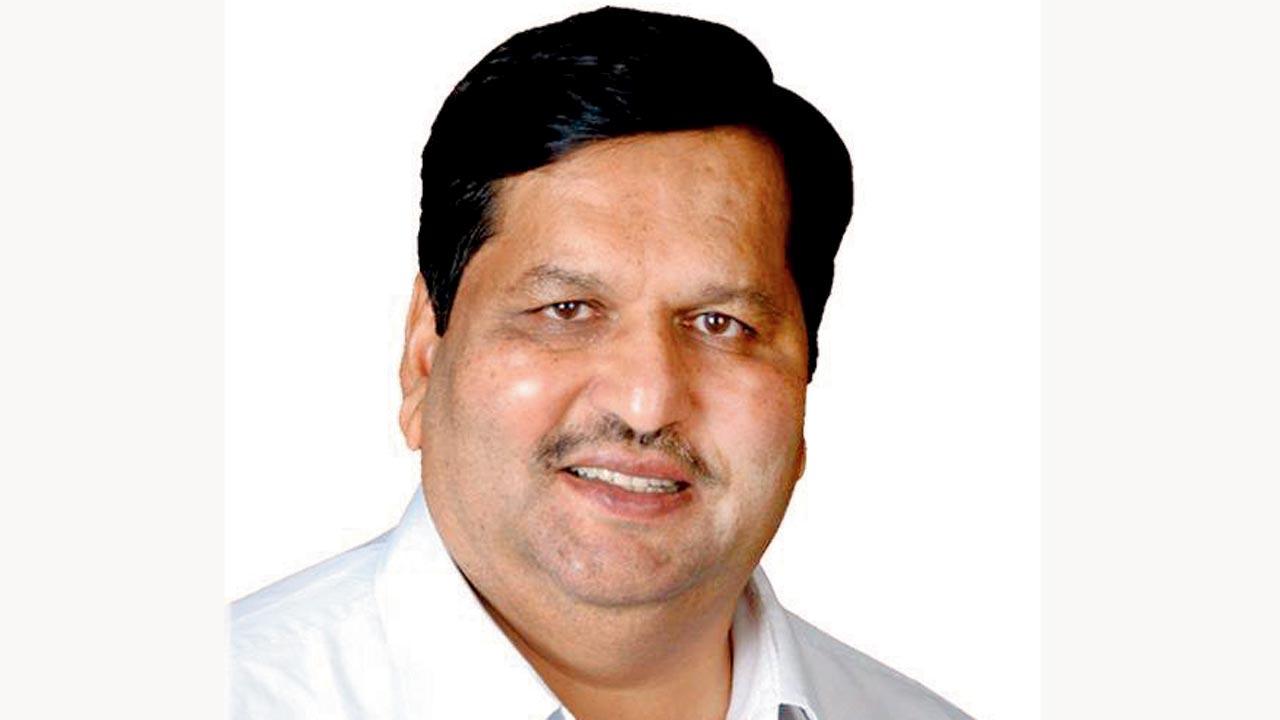 Mangal Prabhat Lodha, state women and child development minister
Mangal Prabhat Lodha, state women and child development minister
Since November last year, Maharashtra has seen more than 30 rallies by right-wing organisations under the banner of the Hindu Jan Aakrosh Morcha, demanding the same. A group, Sakal Hindu Samaj, made up of the VHP, Bajrang Dal, Durga Vahini and other right-wing outfits have covered 20 of the state’s districts, including Mumbai, with rallies against love jihad.
While state ministers like Gulabrao Patil have given their stamp of approval to these rallies—he attended the Hindu Jan Aakrosh Morcha in Jalgaon, where he reiterated the state government’s commitment to fight love jihad—some like Lodha have distanced themselves from it for now: “We have come up with our committee with good intentions and don’t want to be part of the controversy.”
 Milind Parande, Kulwant Sarangal, Mohd Ovais, Swati Bhagchandani and Prachi Hatiwlekar
Milind Parande, Kulwant Sarangal, Mohd Ovais, Swati Bhagchandani and Prachi Hatiwlekar
According to a research paper published in the international peer reviewed journal, Multidisciplinary Digital Publishing Institute, titled The Securitisation of Love Jihad by Andrea Malji and Syed Tahseen Raza from the Hawaii Pacific University and the Aligarh Muslim University respectively, one of the earliest influences was a pamphlet, Hindus: A Dying Race (1909), written by Hindu nationalist leader UN Mukherji. In the pamphlet, Mukherji warned that a demographic shift was underway as low-caste Hindus were converting en masse to Christianity and Islam. He also stated that Muslim men were marrying Hindu widows. He warned that if Hindus did not unite like other religious communities in India, they would eventually become the “minority”.
The term love jihad, however, started gaining prominence only in 2009, in Kerala, where the Kerala Catholic Bishops Council claimed that more than 2,600 Christian women had been converted to Islam since 2006. According to news reports, two women were allegedly abducted, forcibly converted and coerced into marriage with Muslim men. It was later reported to be part of a hate campaign.
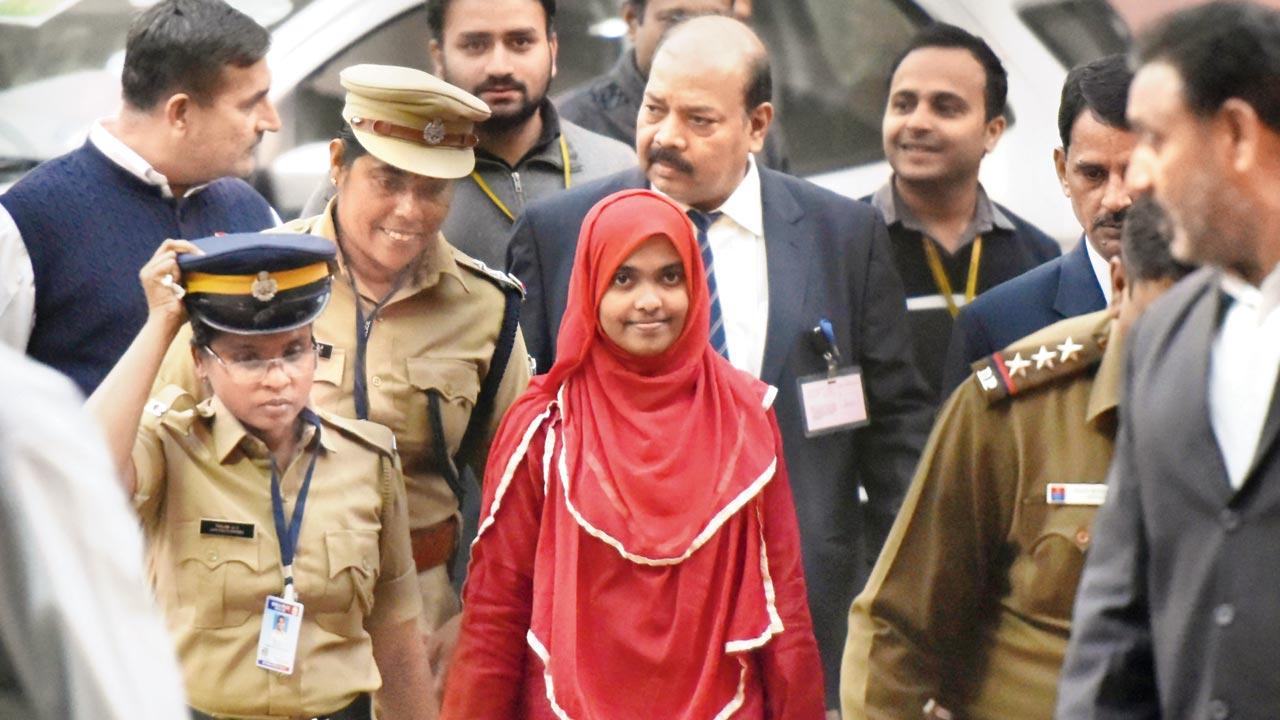 In the alleged love jihad case of Hadiya aka Akhila, who married Shafin Jahan in Kerala, the Supreme Court in its April 2018 judgment ordered that she had absolute right to choose her life partner, faith or change her faith if she desired. Justice DY Chandrachud in his part of the judgment observed that faith and marriage were both personal choices protected by the right to privacy which could not be obstructed by any third party. Pic/Getty Images
In the alleged love jihad case of Hadiya aka Akhila, who married Shafin Jahan in Kerala, the Supreme Court in its April 2018 judgment ordered that she had absolute right to choose her life partner, faith or change her faith if she desired. Justice DY Chandrachud in his part of the judgment observed that faith and marriage were both personal choices protected by the right to privacy which could not be obstructed by any third party. Pic/Getty Images
Although there is no central anti-conversion law in India right now, at least 11 states have their own versions restricting forceful religious conversions. These include Odisha (1967), Madhya Pradesh (1968), Arunachal Pradesh (1978), Chhattisgarh (2000 and 2006), Gujarat (2003), Himachal Pradesh (2006 and 2019), Jharkhand (2017), Uttarakhand (2018) and Uttar Pradesh (2021), Karnataka (2021) and Haryana (2022). Maharashtra, which is still testing waters, is perhaps next in line.
In an interview to a leading national daily, Fadnavis had said that “cheating in interfaith marriages has increased over the past few years”. mid-day reached out to the state’s Additional Director General of Police (ADG), law and order, Kulwant Sarangal, to check if the state had data to this claim.
 Supriya Sule, NCP leader
Supriya Sule, NCP leader
“Nationally, there is no such segregation of domestic violence data based on faith or caste. Cases under National Crime Record Bureau [NCRB] are recorded on the basis of domestic violence and crimes against women,” he said.
According to NCRB’s latest report, Crime in India 2021, the total crimes against women in Maharashtra were put down at 39,526 incidents, involving 40,193 women at the rate of 66 per cent. As many as 10,095 cases of cruelty by husband or relative against women in the state were recorded involving 10,101 women.
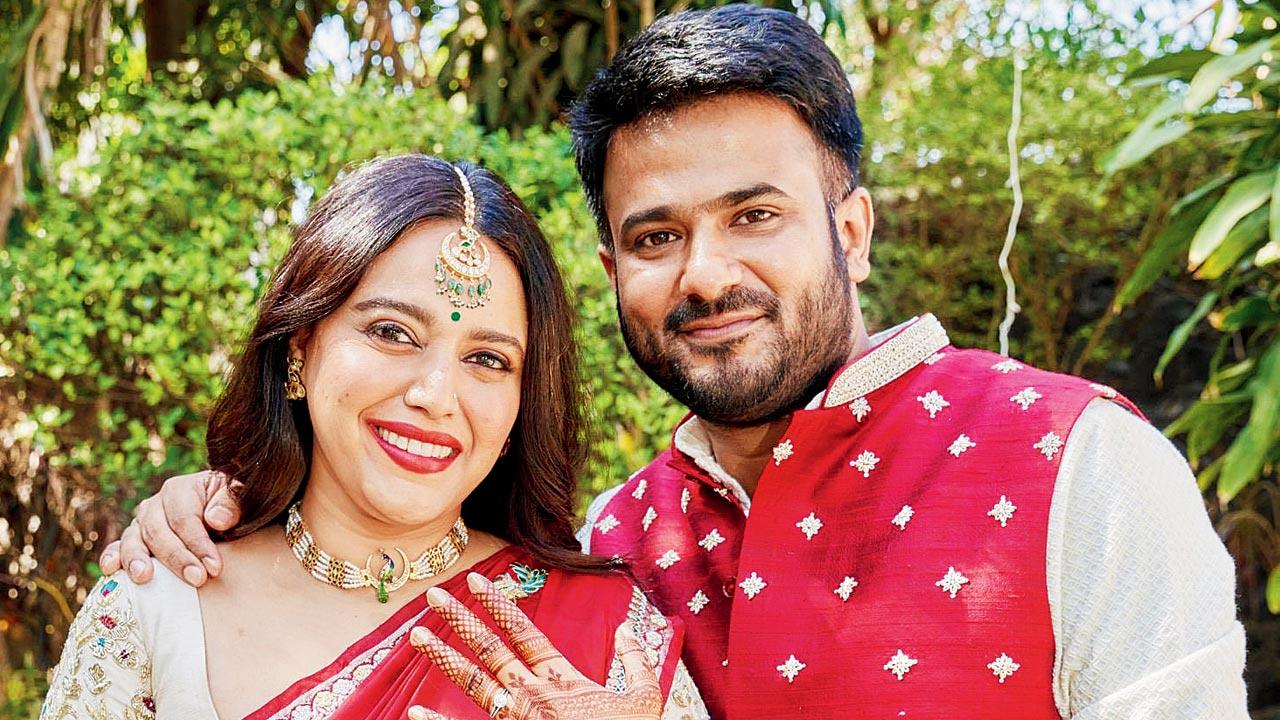 Actor Swara Bhasker married political activist Fahad Ahmad in court this week. Posting photographs from the day, she cheered for the Special Marriage Act. “At least it exists & gives love a chance… The right to love, the right to choose your life partner, the right to marry, the right to agency these should not be a privilege,” she wrote. Pic/Twitter
Actor Swara Bhasker married political activist Fahad Ahmad in court this week. Posting photographs from the day, she cheered for the Special Marriage Act. “At least it exists & gives love a chance… The right to love, the right to choose your life partner, the right to marry, the right to agency these should not be a privilege,” she wrote. Pic/Twitter
“There is no data with the government to prove that interfaith marriages are the only ones prone to domestic violence. What is the evidence that this does not happen in marriages where patrikas and kundlis are matched well in advance?” asks Prachi Hatiwlekar, state general secretary of the All India Democratic Women’s Association (AIDWA), Maharashtra.
AIDWA is part of the group, Salokha Samiti, that was formed along with Opposition parties in the state, and women rights and human rights activists, on February 13, to oppose the controversial IMFCC.
Hatiwlekar says the IMFCC is not just illegal and unconstitutional, but also an insult to women’s rights. “Tracking the actions of women will only expose them to greater risk. Couples wanting to marry under the Special Marriage Act, 1954, already face problems,” she says.
According to the Special Marriage Act, 1954, names and addresses of a couple deciding to opt for a registered court marriage are displayed on a board at the said court for 30 days, inviting objections. In Maharashtra, the details are also displayed online on the website of the Department of Stamps and Registration.
A thirty two-year-old Mumbai-based woman belonging to the Sindhi community had to bear the brunt of this rule, when she decided to marry a Muslim man back in July 2021.
Our parents did not have a problem with our decision but were concerned about being targeted by religious bigots.” In an attempt to not add to their worries, the couple decided to tell them about their court marriage once things were through. They got themselves registered at the Khar court on June 16-17 that year.
“A week later, my father was sent a postcard written in Hindi and Marathi, which stated that his daughter was getting married secretly to a Muslim in court,” she recalls. The postcard further stated that “Muslim men marry Hindu women and sell them off to bars in Arab countries”. “I had to calm my father down,” she tells us now.
Just a week before her wedding, a woman and two men landed at her home. “The woman kept asking for my father; when I realised something was amiss, I tried to get rid of her. Suddenly, two men, one of whom is a general store owner in Khar, arrived at the scene. They were able to meet my father and brainwash him and my brother,” she says. It did not stop here. News about her marrying a Muslim was shared on social media, and on housing society groups. She was socially boycotted by her friends and extended family.
Though panic-stricken, the couple went ahead with the court wedding as planned. “Our parents didn’t attend the function, but a week after our marriage, both of us started visiting them. I had a nikah in September, which was attended by both sides. I didn’t convert to Islam. I am agnostic, but believe in a higher power.” She says had the bigots not intervened in her wedding plans, she would have had a grand celebration. “My friends used to say I would be forced into following Islam and be made to wear a burqa. Honestly, my father was more conservative [than my in laws]. In fact, I only began wearing dresses after I got married.” Durga says had the bigots not intervened in her wedding plans, she would have had a grand celebration. “My friends used to say I would be forced into following Islam and be made to wear a burqa. Honestly, my father was more conservative. In fact, I only started wearing dresses after I got married.”
Another Mumbai resident who married her Muslim partner in August 2021, describes the IMFCC as “problematic”. Her parents had an intercaste marriage, but “since childhood it was made crystal clear that a Muslim and Christian are not to be married”. “Most of my relatives did not turn up [for the wedding],” she says. She says she was boycotted by her maternal and paternal families. Her mother passed on soon after.
She asserts that neither is she keen on reconciling with the family, nor does she want state intervention. “I have a strong suspicion that the main purpose of this committee is to get data. In fact, when we had to put up the wedding notice in court, I was scared that we would be attacked by some right-wing groups. I doubt the intentions are pure.”
The fear of being targeted is real. It can be gauged from the fact that all the interfaith couples that we reached out to, refused to speak on record or be photographed. A couple in an interfaith marriage are both communications professionals and decided to leave India for good a year ago because they didn’t know what fate awaits the children of Muslim-Hindu parents.
National General Secretary of VHP Milind Parande says their organisation has been carrying out “regular awareness programmes in schools and colleges” on love jihad. “We cover a range of women through our women’s wing and Durga Vahini wing. We are doing this to safeguard our Hindu girls from being ensnared by Muslim men. It’s a cause for concern for the whole society.”
Under this awareness programme, the VHP and other right-ring groups explain to women the “different types of tactics used by Muslim men”. “They use fake names on social media, deceive them with fake identity details, target them and convert them to Islam... IMFCC uske liye ek sarahniye pehel hai [IMFCC is a solution to this problem],” he says.
Member of Parliament from Baramati and leader in the Nationalist Congress Party (NCP) Supriya Sule, who attended the GR opposition meeting on February 13 in Mumbai and voiced her concerns, tells mid-day that the Opposition will reach out to minister Lodha, understand the proposal and request inclusion of all stakeholders in the IMFCC, before the committee starts work. “The problem is not just how it will affect women, but how it could intervene in an Indian’s constitutional right to marry anyone of her choice. It is not about one woman, but every Indian’s freedom of choice. Are we not a democratic, constitutionally run country?” Giving her own family’s example, Sule says that her father-in-law is married to a Christian woman. “Does love jihad have any constitutional meaning or are we now going to act on personal definitions from a group? We are open to discuss it if it is a constitutional phrase, but it is not. As far as reconciliation of women in violent marriages is concerned, India has a whole system in place already, from family courts to women cells in police stations, the DV Act... what is the need for another committee? Tomorrow, they will launch a committee to decide which careers are good for us [women].”
Clinical psychologist Swati Bhagchandani says that reconciliation in cases of conflict where a woman is not in touch with her family, overlooks the fact that families can also be abusive. “Trauma generally follows a pattern. Often while trying to come out of a problematic family space, a woman ends up in a similar space which they have chosen themselves. Reconciliation is only possible if the family dynamics of the girl are fully understood; it cannot be forced on her.”
Mihir Desai, human rights lawyer and member of People’s Union for Civil Liberties (PUCL), which is also opposing the IMFCC, says that the IMFCC “violates the right to privacy under Article 21, intervenes in the freedom of religion and is also discriminatory on grounds of gender, for just including married women and not men”.
“Law is always read in two ways—one in how it is read and the other in how it is worded. The IMFCC’s modus operandi as per the GR reeks of shady execution. They want to target only Hindu-Muslim couples—even though they may not spell it out on paper. People will be scared, there will be fear psychosis in men and it negates the fact that aggression has little to do with faith or religion,” he says.
Meanwhile, many are already bearing the brunt of the love jihad rhetoric and anti-conversion law. Mohd Ovais, 23, from Uttar Pradesh’s Bareilly, was arrested within 24 hours of the law coming in. “I spent the next 24 days in jail, for no fault of mine,” he tells us.
UP promulgated the Prohibition of Unlawful Religious Conversion in November 2020, which was later converted into an Act in March 2021. Ovais was booked under the Act and IPC Sections 504 (breach of peace) and 506 (criminal intimidation).
“I loved a Hindu girl from the neighbourhood who studied with me. She insisted on marriage, but I clearly told her that I will only get married after I am financially stable and have secured a job. She eloped from her home soon after in 2020, much before this ordinance had come out. Three days later, she was found by the police and it was clarified on paper that I had no role with her going missing or being found. My only fault was that I trusted the police and did not take a copy of this paper, which cleared my name from this case,” Ovais claims. The woman was married by her family to another man, but when the Act was enforced, his dreams to join the Army came undone. “I now work at a scrap dealer’s shop. My family is suffering, as the case has been on for the last two years, with no movement at all. I have no idea what the future holds.”
Also Read: Hindutva bodies organise morcha against 'love Jihad', illegal conversions in Pune
 Subscribe today by clicking the link and stay updated with the latest news!" Click here!
Subscribe today by clicking the link and stay updated with the latest news!" Click here!










